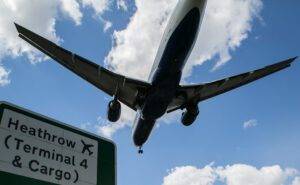Heathrow Airport is set to confront a near-£1 billion surge in business rates from 2026, a burden likely to be transferred to passengers by the airport’s prospective new foreign owners.
Europe’s busiest airport has been engaged in covert discussions with Whitehall officials, revealing an anticipated annual business rates escalation from £200 million to £300 million over three years starting in 2026. Heathrow, already the UK’s largest payer of these rates, has been attempting to keep this £900 million total increase confidential to avoid backlash from airlines.
While Heathrow can pass the heightened rates onto airlines via increased airport charges, this move could exacerbate already tense relationships with carriers like British Airways and Virgin Atlantic, who have consistently voiced concerns over excessive charges.
With around 80 million travellers passing through Heathrow annually, the £300 million annual rate hike equates to an estimated £3.75 per passenger if airlines pass on the additional costs. Consequently, a family of four might see an extra £15 per flight added to their fares.
Heathrow’s financial woes might be alleviated by Labour’s recent manifesto pledge to “replace the business rates system.” Nonetheless, there is uncertainty regarding how Labour’s proposed overhaul would impact airports, as the manifesto seems aimed at aiding retailers.
Labour’s manifesto states: “This new system will level the playing field between the high street and online giants, better incentivise investment, tackle empty properties and support entrepreneurship.” However, Paul Turner-Mitchell, a business rates expert at Altus Group, noted that despite promises of a “fairer system,” Labour intends to collect the same annual business rates revenue.
The Conservatives have committed to supporting “small businesses and the high street” with £4.3 billion in business rates aid over the next five years, suggesting that large enterprises like Heathrow may not benefit.
A Heathrow insider commented: “The proposed rise in business rates would increase operational costs by potentially hundreds of millions of pounds, none of which can be reinvested in Heathrow.”
This looming business rates hike presents a significant challenge for Heathrow’s potential new owners. A Saudi-led consortium recently agreed to acquire control of the airport, reducing the British shareholder, the Universities Superannuation Scheme (USS), to a mere 2.1 per cent stake. The primary shareholders will include the French private equity firm Ardian, Qatar’s sovereign wealth fund, and Saudi’s Public Investment Fund (PIF), together holding around 58 per cent ownership.
The methodology for calculating Heathrow’s business rates changed last year, shifting from land and building valuations to profitability assessments. Current charges are based on 2021’s financial performance, a pandemic-stricken year. Pre-2023, Heathrow’s business rates bill stood at about £120 million annually.
From 2026, the rates will reflect Heathrow’s 2024 returns, which are markedly higher. The airport reported a £189 million pre-tax profit in the first quarter of this year and recently celebrated record annual passenger numbers for the year ending May 2024.
A Heathrow spokesperson stated: “Airports and airlines agree — this decision needs a rethink. Huge hikes in business rates simply increase costs for consumers without adding a single pound of investment to the services they are using. The whole sector wants to see more joined-up thinking between government departments to avoid decisions like this, which only curb our ability to compete internationally and meet consumers’ demands for smooth, safe journeys and progress on sustainability.”
Read more:
Heathrow Faces £900 Million Business Rates Bombshell

